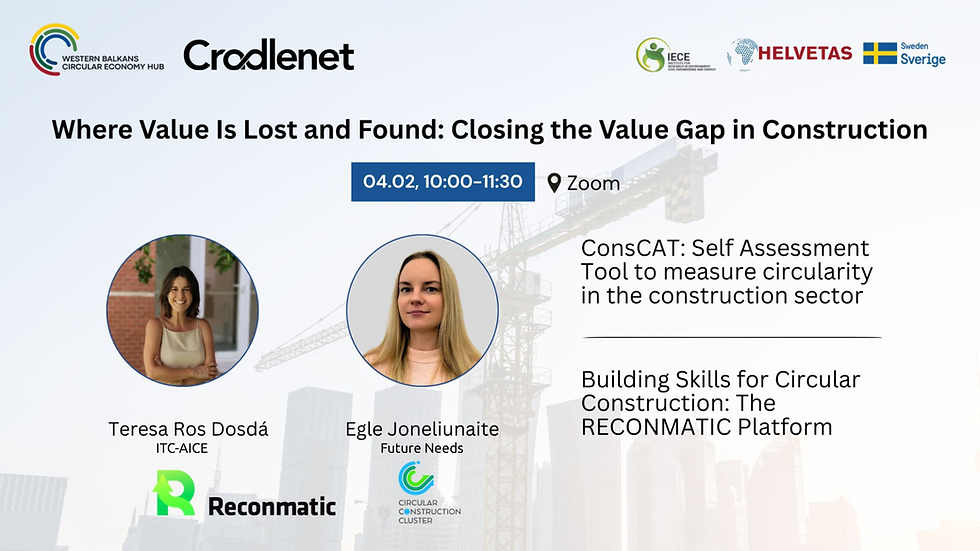Inspiring the textile industry in TEXWASTE 2023 Conference
- May 21, 2023
- 3 min read
Last month, our project coordinator, Mr. Jan Valentin from the Czech Technical University in Prague, took part in the TEXTWASTE 2023, in Hradec Kralove, a regional centre in East Bohemia, Czech Republic.

The Conference was a chance to learn the common problems faced by the textile industry and the construction sector in terms of sorting waste, recycling, and sustainability. It also offered inspiration to our consortium with ideas derived from the textile industry.
Mr. Jan Valentin presented his speech entitled “Inspiration for the textile industry: how we currently approach the recycling of construction and demolition waste”.
He also introduced the RECONMATIC project to the audience and the challenges we are facing in the construction sector. More specifically, he shared his thoughts on what the construction sector is looking for, like material separation for better valorisation, digitalisation tools for better decision-making, how to deconstruct buildings, etc.
In total, there were nine presentations and the first was held by the director of the Waste Department of the Czech Ministry of Environment. A very interesting presentation was given by Professor Katerina Rose from Reutlingen University in Germany about actual trends and new approaches for better recycling of the textile and clothing industry. Namely, she presented the challenges of using RFID (Radio-frequency identification) in clothing which would make later sorting and recycling easier. Another thought shared was dealing with IR spectroscopy which is however problematic if textile materials with several layers of different material types are used.
Another interesting topic raised was that the textile industry even in markets like Germany still faces similar problems to the construction industry when mixed waste is sorted manually. This issue was also mentioned by Professor Pavel Kuran, Dean of the Faculty of Environment from Jan Evangelista Purkyne University. He spoke mainly about the possibilities and challenges of chemical recycling of textile materials. In his presentation, we got more inspirational ideas that could be useful for the construction sector since it seems that there are possibilities to separate different types of fibers (synthetic and cotton). Namely, the micro cellulose produced from the chemical process of cotton could be used in some solutions for reinforcing mortars, plasters, or even asphalt mixtures.
Other insightful ideas were presented by the company RETEX, which introduced some new solutions where textile waste is turned into new thermal and acoustic insulation to be used in gypsum board partition walls. Last but not least, Mrs. Dana Rastocna-Illova from Austrian OETI spoke about how the industry is processing LCA reports, and how textile products can be certified based on their carbon and water footprint.
Some further information worth mentioning was that the European Commission is presently working on several directives or regulations which are going to influence most industries (like new rules on water protection, further improvements in the taxonomy schemes, new generation for green public procurement, regulation on packing or new exposure limits for biphenyls which will dramatically reduce the production of polystyrene). Additionally, discussions were made on extended producer responsibility as the new carbon duty (customs) accompanied by the first rules, will come into force in autumn 2023. This new carbon duty will apply to all importers who are approaching the EU market so that a balance between EU-based companies that are affected by EU-ETS and companies from third countries is reached.

The Conference was organized by the Czech Technology Platform for Textile, the Regional Centre for Investments, Development, and Innovations, and the Cluster Technical Textile.








